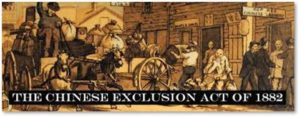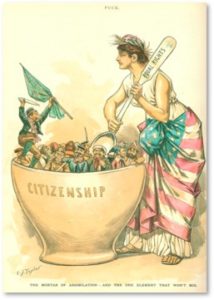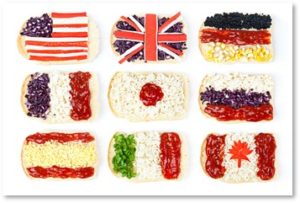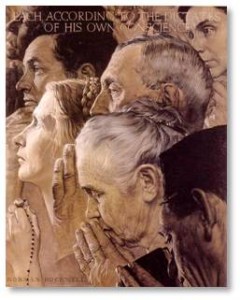Yesterday I participated in an interesting conversation in the women’s locker room that made me realize how different America is from some other countries.
Ethnicity vs Nationality
One woman was commenting to another, a Russian immigrant, that she had been in a Boston suburb and didn’t realize how many Russians lived there.
The second woman corrected her immediately. “Not Russians,” she said emphatically. I expected her to add that they were Ukrainians or from some other part of the former Soviet Union. Instead, she said: “They are Jews who lived in Russia.”
This comment startled several of us and I said, “But they were Russian citizens.”
“Not Russians,” the woman reiterated. “Different faith. Different culture. Different food. Different everything. Not Russian.”
The first woman persisted. “But they lived in Russia. Doesn’t that make them Russians?”
“No!”
Clearly the woman defined “Russian” by ethnicity not nationality. Being “Russian” and “living in Russian” are two very different things to her. This is the opposite of how most Americans think.
A Culture of Immigration
 We have a culture of immigration, assimilation, contribution and acceptance—even if that takes a few generations. Does the process always go perfectly? Of course not. America has produced some pretty dark episodes — most of which are not taught in schools. It’s much easier to pretend they never happened.
We have a culture of immigration, assimilation, contribution and acceptance—even if that takes a few generations. Does the process always go perfectly? Of course not. America has produced some pretty dark episodes — most of which are not taught in schools. It’s much easier to pretend they never happened.
Our history includes “No Irish Need Apply” signs, the Chinese Exclusion Act of 1882, anti-Semitic demonstrations, and attempts to prevent children from speaking French in Maine, among many others. In fact, wherever a majority of immigrants settled, regardless of where they came from, anti-immigrant sentiment sprang up and people of that ethnic group were demonized. The current anti-immigrant propaganda currently coming from the White House requires no comment.
That process created a mind-set of hyphenated Americans. We are Americans first by nationality. We are Italian-Americans, Irish-Americans, Greek-Americans, Russian-Americans etc. by ethnicity. We can be both because one does not cancel out the other.
Americans First
While American citizens may follow the goings on in their country of origin, they do not put those allegiances ahead of their civic duties in this country. Typically, immigrants want to become Americans. Because they have to study civics to pass their citizenship test, they often know more about how our government works than native-born Americans. They usually spell better, too.
Years ago, I was speaking to one of my company’s sales representatives, a man from Germany. He could not understand the American acceptance of others. He asked, “Don’t you feel more comfortable when you are among people who look like you, who look American?”
The Difference in People
 In fact, the workers outside of the conference room illustrated the difference. By walking out the door he could see a man of Chinese ethnicity, a woman of Irish background, a man and a woman descended from enslaved people brought from Africa, and me, of French-Canadian ancestry. The cubicles around us held blond-haired blue-eyed people, dark-haired dark-skinned people, people of Asian extraction, and red-haired people with skin George Carlin described as “Irish phosphorescence.”
In fact, the workers outside of the conference room illustrated the difference. By walking out the door he could see a man of Chinese ethnicity, a woman of Irish background, a man and a woman descended from enslaved people brought from Africa, and me, of French-Canadian ancestry. The cubicles around us held blond-haired blue-eyed people, dark-haired dark-skinned people, people of Asian extraction, and red-haired people with skin George Carlin described as “Irish phosphorescence.”
There is, in fact, no “American look.” We are different. We are the same.
We think of this as the melting pot but it’s really more like a fruitcake: lots of different bits mixed into one big batch of batter.
Becoming American
Eventually, immigrants learn to speak English, go to school, start businesses, contribute to the community, run for office, and occasionally become famous. Their descendants break out of the grandparents’ neighborhoods: Little Italy, Korea Town, Persian Square, Chinatown.
 People who arrived a generation or two earlier start eating the food of more recent immigrants and discovering that it is delicious. “Ethnic” food becomes adventurous dining, becomes regional food, becomes authentic food, becomes trendy food. My father used to call it “exotic.” I call it dinner.
People who arrived a generation or two earlier start eating the food of more recent immigrants and discovering that it is delicious. “Ethnic” food becomes adventurous dining, becomes regional food, becomes authentic food, becomes trendy food. My father used to call it “exotic.” I call it dinner.
We accept lox and lo mein, shepherd’s pie and moussaka, weisswurst and linguica, kimchee and kolaches. Some people—not me—even learn to enjoy lutefisk and gefilte fish. Food festivals become celebrations of ethnic origins. The descendants of haters and bigots brag about their diverse community.
And so it goes.
Opening My Eyes
We separate ethnicity from nationality and never describe a fellow citizen as a “[nationality] living in America.” But that short conversation opened my eyes to how another country sees things. I’m not naive. I know there was a large dose of anti-Semitism in the attitude this woman expressed. And I know there are groups of Americans who don’t accept any people of color under any conditions. Still, that’s not how most Americans feel.
It’s no wonder Russia’s Jews move out of a country where they were never accepted as equal citizens. Why live somewhere when you can never be considered one of them? Why not come here instead? And so, they do. The cycle continues.


One of your best posts!